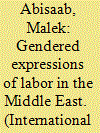| Srl | Item |
| 1 |
ID:
146984


|
|
|
|
|
| Summary/Abstract |
A dearth of information is available on workingwomen in the Middle East during the 19th and first half of the 20th century. This gap is compounded by the male biases of the official reporters, journalists, unionists, labor activists, and scholars who produced the information that does exist. Nevertheless, it is possible to write a gendered history of labor on the basis of less-than-ideal sources, which can be enriched by the use of oral history, popular literature, autobiographies, and even fieldwork focused on women's and men's family relations and work patterns.
|
|
|
|
|
|
|
|
|
|
|
|
|
|
|
|
| 2 |
ID:
135326


|
|
|
|
|
| Summary/Abstract |
This article sheds light on the development in the relationship between the Lebanese Maronite church and the French colonial authorities during the mid-1930s. It focuses on the confrontational stance of the church toward the French under the leadership of Patriarch Antoine ’Arida (1863-1955). I delineate ’Arida’s resistance to the imposition of the tobacco monopoly, the Régie, and his diplomatic and political maneuvers, culminating with the 1935 popular uprising against the French, which cut across Muslim and Christian lines. Through the analysis of French archival documents and reports, I argue that the deterioration in Maronite-French relations was primarily caused by the colonial mapping of Grand Liban and its disruptive consequences for Mount Lebanon’s leadership and economy. With the French imposition of the tobacco monopoly, the conflict took the form of a nationalist resistance against the French. Ultimately, the Maronite Church pursued a delicate balance between the interests of its parish and commitments to the French. The crisis sparked a critique of the French colonial logic, pushing the Maronite Church and the nationalist Lebanese elite to struggle for independence from the French.
|
|
|
|
|
|
|
|
|
|
|
|
|
|
|
|